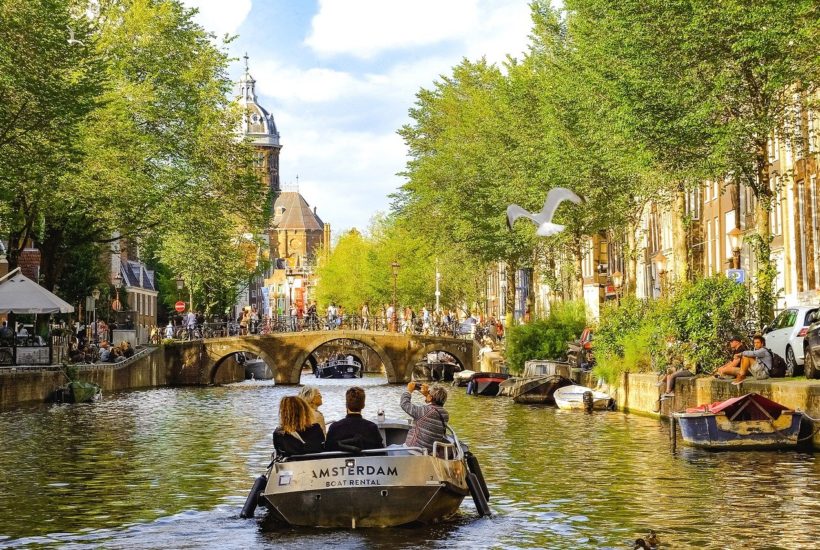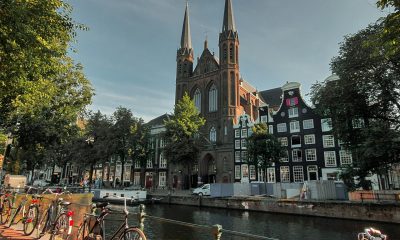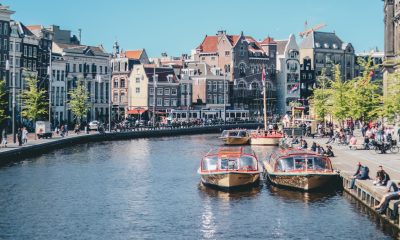Cannabis
Tourists will face ban from Amsterdam coffee shops
Starting this year, foreign visitors will face ban from the famous Amsterdam coffee shops. This is not the first attempt by Dutch decision-makers to impose a tourist ban on coffee shops. There have also been various reasons for such measures, one being the crime problem of smuggling, another simply the excessive number of tourists in Amsterdam.

The year 2020 was only halfway enjoyable for a few people. Most will probably associate it with restrictions and the loss of freedoms. People want to get out again, they want to move around, and they also want to travel. As far as that is concerned, the beginning of 2021 also brought with it some terrible news for all cannabis users. Reports made the rounds that efforts are being made in Amsterdam to no longer allow foreign tourists into coffee shops. However, it is also clear that such an undertaking cannot be enforced so easily without opposition in the Dutch Mecca of smoking cannabis.
Read more about a possible ban on tourists in Amsterdam’s coffee shops and find other important cannabis news with the Hemp.im mobile app.
Many Dutch profit from cannabis tourism
This is not the first attempt by Dutch decision-makers to impose a tourist ban on coffee shops. There have also been various reasons for such measures, one being the crime problem of smuggling, another simply the excessive number of tourists in Amsterdam.
However, the tourist ban has never really gained majority support, because too many people in the Netherlands profit directly or indirectly from the foreigners who flock en masse to the coffeeshops and who, of course, also bring sales to the other stores, restaurants, and accommodations. And that is why there is also fierce resistance to the new attempt to keep foreigners away from the legal or tolerated cannabis trade.
Associations launch campaign against tourist ban
A major advertising campaign was launched in the Amsterdam newspaper Het Parool on January 23rd, opposing the idea of a tourist ban. The originator and initiator of the high-profile campaign is, among others, the Amsterdam Coffeeshop Association (Bond van Cannabis Detaillisten – BCD). The message is clear, it reads “Don’t do this to our city!” In the newspaper ad, the BCD makes it clear that Amsterdam’s coffee shops and their visitors are not the problem, but an important institution and an effective ally in the fight against the city’s illegal drug trade.
Banning tourists would promote economic harm while strengthening the illegal drug trade. The BCD’s website also has the full ad text. The action is supported by the official drug counseling center of the VOC Foundation (Verbond voor Opheffing van het Cannabisverbod – Legalization Initiative), the Foundation for Drugs Policy and the platform Cannabis Businesses Netherlands (PCN).
The Netherlands should take a pioneering role in Europe
Amsterdam without the international guests who are always wide-eyed about the tolerated exceptional situation that prevails regarding cannabis – who can imagine such a thing? Admittedly, the crowds are sometimes beyond a level that one might call nice and pleasant, but still, the tourist ban measure seems neither appropriate nor suitable to solve this. In the coming weeks, we will learn whether the opposing forces are strong enough to prevent the tourist ban.
There are enough arguments on hand to make the idea that foreigners should not be allowed to shop in coffee shops seem absurd. Within a very short time, a black market would be established on the streets, to name just one reason. Demanding and promoting cannabis legalization in other EU countries is probably the only method that could then distribute tourism better and not play into the hands of drug crime. The liberal handling of cannabis should therefore rather be legally consolidated by the Netherlands and take the position of the pioneer within the European Union.
__
(Featured image by djedj via Pixabay)
DISCLAIMER: This article was written by a third party contributor and does not reflect the opinion of Born2Invest, its management, staff or its associates. Please review our disclaimer for more information.
This article may include forward-looking statements. These forward-looking statements generally are identified by the words “believe,” “project,” “estimate,” “become,” “plan,” “will,” and similar expressions. These forward-looking statements involve known and unknown risks as well as uncertainties, including those discussed in the following cautionary statements and elsewhere in this article and on this site. Although the Company may believe that its expectations are based on reasonable assumptions, the actual results that the Company may achieve may differ materially from any forward-looking statements, which reflect the opinions of the management of the Company only as of the date hereof. Additionally, please make sure to read these important disclosures.
First published in HANF MAGAZIN, a third-party contributor translated and adapted the article from the original. In case of discrepancy, the original will prevail.
Although we made reasonable efforts to provide accurate translations, some parts may be incorrect. Born2Invest assumes no responsibility for errors, omissions or ambiguities in the translations provided on this website. Any person or entity relying on translated content does so at their own risk. Born2Invest is not responsible for losses caused by such reliance on the accuracy or reliability of translated information. If you wish to report an error or inaccuracy in the translation, we encourage you to contact us.

-

 Africa1 week ago
Africa1 week agoCôte d’Ivoire Unveils Ambitious Plan to Triple Oil Output and Double Gas Production by 2030
-

 Business6 days ago
Business6 days agoThe TopRanked.io Weekly Digest: What’s Hot in Affiliate Marketing [NordVPN Affiliate Program Review]
-

 Fintech2 weeks ago
Fintech2 weeks agoBitget Secures Operational License in Georgia, Strengthening Its Eastern Expansion
-

 Cannabis2 days ago
Cannabis2 days agoCannabis Company Adopts Dogecoin for Treasury Innovation
























